The Chancellor’s Fellows Program honors outstanding faculty members early in their careers. Honorees each receive a one-time award of $25,000 to be used for research, teaching or service activities. Chancellor’s Fellows awards are supported by private contributions to the UC Davis Annual Fund, Parents Fund and Davis Chancellor's Club Fund.
Chancellor’s Fellows Award Recipients
2024-2025 Fellows
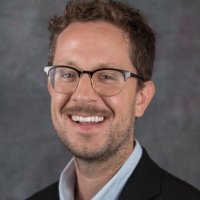
Randy Carney
Associate Professor — Department of Biomedical Engineering, College of Engineering
Randy Carney’s research is at the cutting-edge of cancer treatment and diagnostics. He explores how extracellular vesicles, nanoparticles released by all living cells to transmit important biomolecular messages, can be used for early cancer detection and innovative nanotechnology drug platforms. Carney and his team also develop novel Raman spectroscopy tools to investigate the roles extracellular vesicles play in cancer.
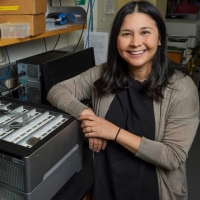
Megan Dennis
Associate Professor — Department of Biochemistry and Molecular Science, School of Medicine
Megan Dennis has become a leader in studying the genetic factors affecting the brain, particularly in conditions like autism. Her research aims to identify hidden genetic changes linked to diseases, improving diagnoses and treatments.
In addition to her research, Dennis is a dedicated educator and mentor, having taught numerous courses and mentored over 50 students, many of whom have gone on to successful careers. She has also worked to increase access to STEM education for students from diverse backgrounds, drawing from her own experiences as a first-generation college student. Dennis has earned several prestigious awards, including the Sloan Fellowship and NIH Director’s New Innovator Award.
As a Chancellor’s Fellow, Dennis will continue advancing human genetics research and inspiring students, supported by UC Davis institutions like the MIND Institute and Genome Center. She remains committed to making science accessible to all.
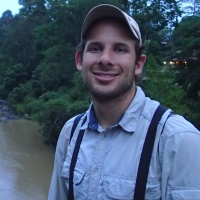
Daniel Karp
Associate Professor — Department in the Department of Wildlife, Fish, and Conservation Biology, College of Agricultural and Environmental Sciences
Daniel Karp’s research seeks novel solutions for harmonizing food production with biodiversity and conservation. For example, his work has helped farmers determine when and how conserving nature could not only benefit wildlife but also reduce pests and improve crop yields. He was also the first to show that removing habitat around farms to discourage wildlife is counterproductive to eliminating foodborne pathogens in fresh produce.
A prolific and respected ecologist, teacher and mentor, colleagues praise his research output, creativity, intellect, and professionalism.
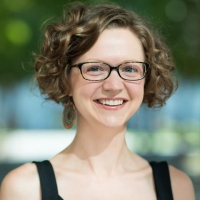
Kassandra Ori-McKenney
Associate Professor — Department of Molecular and Cellular Biology, College of Biological Sciences
Kassandra Ori-McKenney studies tube-like proteins called microtubules that help form a ‘skeleton’ and are involved in transport inside cells. Her research seeks to understand the structure and function of microtubules within neural cells and to investigate how issues with these structures affect neurodevelopmental disorders, neurodegenerative diseases and aging.
By using methods that range from biochemical analyses to cellular assays, microscopy and experimental studies in fruit flies, Ori-McKenney aims to develop a comprehensive understanding of the microtubule cytoskeleton in disease, including traumatic brain injury and Alzheimer’s.
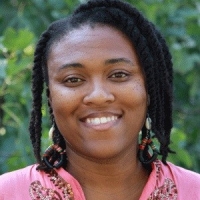
Alexis Patterson Williams
Associate Professor — Department of Education, School of Education
Alexis Patterson Williams is a science education scholar whose research goal is to create new pathways for diverse learners to engage with and excel in science classrooms. Central to her work is the desire to confront hierarchical classroom dynamics so that learning opportunities for historically marginalized students can be improved. Her recent research examines creating space for student emotions in the science classroom, transformative justice pedagogy, and power dynamics in scientific, community-based monitoring projects. She is also exploring justice-oriented teaching and the impact of family input on STEM career choices.
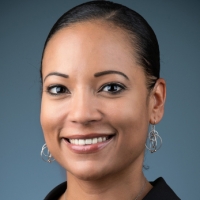
Crystal Rogers
Associate Professor — Department of Anatomy, Physiology, and Cell Biology, School of Veterinary Medicine
Crystal Rogers is a developmental biologist whose research focuses on neural crest cells and their role in embryonic development. She studies the mechanisms that drive formation of these cells across different species, using chicks, quail, peafowl and axolotls as animal models. Her neural crest cells studies contribute to our understanding of craniofacial development and birth defects.
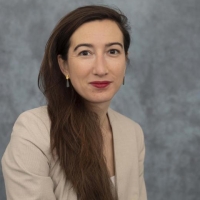
Claudia Sánchez-Gutiérrez
Associate Professor — Department of Spanish and Portuguese, College of Letters and Science
Claudia Sánchez-Gutiérrez is a first-rate scientist in applied linguistics, according to colleagues, specializing in vocabulary and among many things, second-language acquisition. In her data-based approach to language study, she focuses on how students develop language proficiency, how textbooks structure student’s learning, and how instructors can become more successful in the language classroom. Colleagues praise the visibility that her ground-breaking research is bringing to UC Davis across several disciplines.
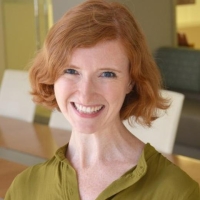
Lauren Young
Associate Professor — Department of Political Science, College of Letters and Science
Lauren Young studies how violence and coercion influence political behavior, including the psychology of people’s political beliefs and action. Much of her work is on Zimbabwe, where the ruling political party relies on repression to maintain power. Her work also extends to coercive politics in Eastern Europe, Latin America and the Caribbean. Her book and journal articles have won multiple awards. She also leads two major grant-funded projects that seek to improve ethics in violence research.
